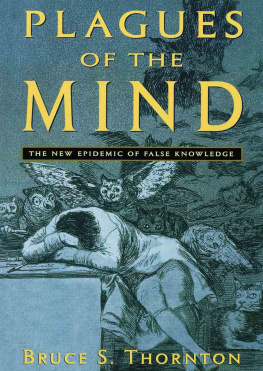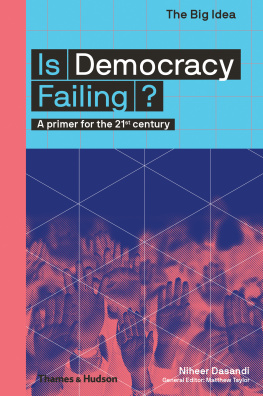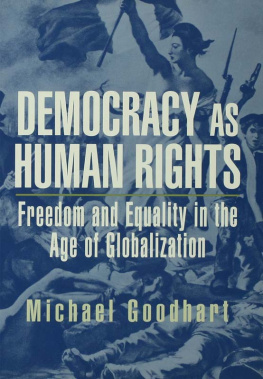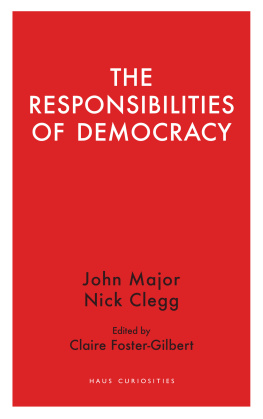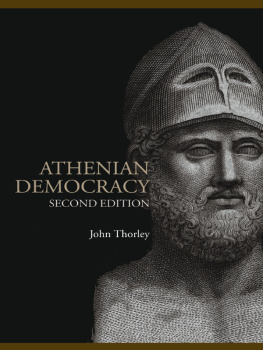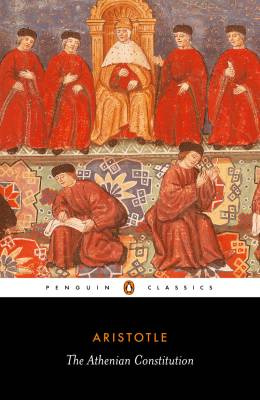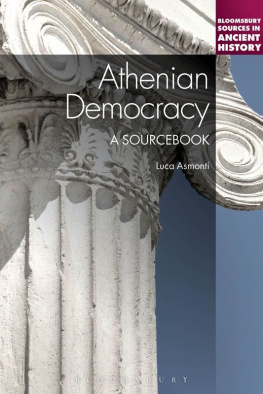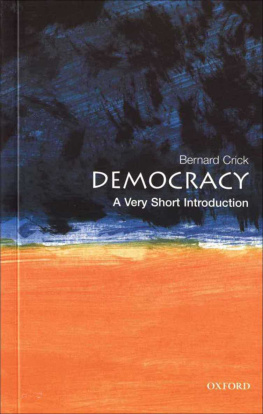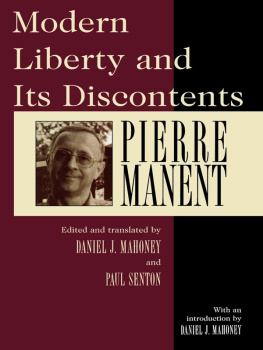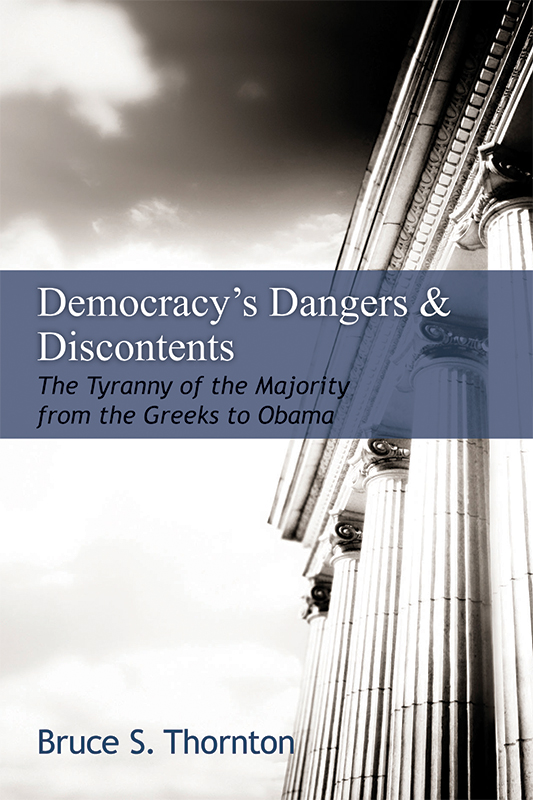Democracys Dangers & Discontents

|
The Hoover Institution gratefully acknowledges
the following individuals and foundations
for their significant support of the
WORKING GROUP ON THE ROLE OF MILITARY
HISTORY IN CONTEMPORARY CONFLICT
|
V ICTOR AND K AREN T RIONE |
W ILLARD AND M ARGARET C ARR |
T HE L YNDE AND H ARRY B RADLEY F OUNDATION |

The Hoover Institution on War, Revolution and Peace, founded at Stanford University in 1919 by Herbert Hoover, who went on to become the thirty-first president of the United States, is an interdisciplinary research center for advanced study on domestic and international affairs. The views expressed in its publications are entirely those of the authors and do not necessarily reflect the views of the staff, officers, or Board of Overseers of the Hoover Institution.
www.hoover.org
Hoover Institution Press Publication No. 653
Hoover Institution at Leland Stanford Junior University,
Stanford, California 94305-6010
Copyright 2014 by the Board of Trustees of the Leland Stanford
Junior University
All rights reserved. No part of this publication may be reproduced, stored in a retrieval system, or transmitted in any form or by any means, electronic, mechanical, photocopying, recording, or otherwise, without written permission of the publisher and copyright holders.
For permission to reuse material from Democracys Dangers and Discontents: The Tyranny of the Majority from the Greeks to Obama, ISBN 978-0-8179-1794-4, please access www.copyright.com or contact the Copyright Clearance Center, Inc. (CCC), 222 Rosewood Drive, Danvers, MA 01923, 978-750-8400. CCC is a not-for-profit organization that provides licenses and registration for a variety of uses.
Hoover Institution Press assumes no responsibility for the persistence or accuracy of URLs for external or third-party Internet websites referred to in this publication, and does not guarantee that any content on such websites is, or will remain, accurate or appropriate.
First printing 2014
Cataloging-in-Publication Data is available from the Library of Congress.
ISBN: 978-0-8179-1794-4 (cloth. : alk. paper)
ISBN: 978-0-8179-1796-8 (epub)
ISBN: 978-0-8179-1797-5 (mobi)
ISBN: 978-0-8179-1798-2 (PDF)
For Esau Kane Thornton
At tibi prima, puer, munuscula
CONTENTS
FOREWORD
Bruce Thornton has written a number of books about the history and nature of democratic government, past and present, especially the dangerous tendency of majority-rule societies to embrace a therapeutic mindset rather than to accept the tragic limitations of the human condition ( Plagues of the Mind: The New Epidemic of False Knowledge ).
Thornton sees limited, republican government as the salvation of civilized societies, but he has also warned that through affluence and license consensual societies can ossify into self-gratification and indifference to their own long-term health and viability ( Decline and Fall: Europes Slow Motion Suicide, written well before the European Union financial crisis).
In the recent The Wages of Appeasement: Ancient Athens, Munich, and Obamas America, Thornton turned to complacent democracies unfortunate habit of shorting defense spending and finding themselves unable to deter aggressive and authoritarian states. Now, in Democracys Danger and Discontents: The Tyranny of the Majority from the Greeks to Obama, Thornton has combined those prior investigations of democratic maladies, both their internal and external affairs, into a comprehensive explanation of the cause of these disturbing symptoms of majority rule. What follows is a 2,500-year annotated exploration about why and how democracies seem to implodeand the correctives for their excesses offered by brilliant ancient and modern observers.
There are plenty of examples of democratic excessand dire warnings about itin the life and thought of Western civilization. Thucydidess wartime Athenians ordered the execution of all the Mytileneans one day, and not quite all of them the next. Plato abhorred rule by the majority. The trajectory of Jean-Jacques Rousseaus call to arms that man is born free, and everywhere he is in chains ended with the French Revolutions Comit de salut public. Alexis de Tocqueville hoped that perhaps Americas unique homestead farmer and an autonomous middle class might check the passions on a fickle underclass. Democracys Danger and Discontents adds lots more examples of democracys strengths but also its myriad excesses. Whereas faces change, causes come and go, crises appear and reappear, the problems of radically democratic societies stay the same. Why do such governments, so ideal in theory, so oftento borrow an earlier Thornton phrasecommit slow-motion suicide in fact?
Most of what modern egalitarians chafe at in our own system of governmentthe Electoral College, the allotment of two senators per state regardless of population size, the Second Amendmentare the constitutional remnants of the Founding Fathers worries that a demos might degenerate into an ochlo s, a veritable mob demanding that its always increasing appetites be met by the state. In contrast, republican government, representative government, and constitutional government were the Founders solutions to square the circle of ensuring consent of the governed while protecting property, unpopular expression, and minority rights.
Bruce Thornton is also a research fellow at the Hoover Institution and a member of our Working Group on the Role of Military History in Contemporary Conflict, which seeks to make sense of contemporary national security issues in light of the history of the past. Democracys Danger and Discontents repeatedly warns about the predictable populist hatred for the better off, the capricious nature of direct voting that was so often predicated on gifted speakers rousing the crowd to fury, and the inevitable lowering of standards to ensure the widest participation of the populace in civic and public life. That said, Thornton is most concerned about the consistent democratic tendency to short collective defense in favor of subsidies for the people. These indulgences, Thornton reminds us, can lead to a society that equates each drachma, sestertius, or euro invested in a hoplite, legionary, or NATO jet as one less devoted to ensuring free admission to the theater, a supplement to the daily grain dole, or a cost-of-living increase in a government pension.
The democratic desire to cut defense and expand redistributive payouts to the citizenry might explain why the descendants of the heroes of Salamis could not stop Philip of Macedon. The latter, like the Persians a century and a half earlier, invaded from the north, but this time successfully with an army only a tenth of the size that had failed under Xerxes. Rome of the fifth century ADa million square miles, seventy million citizenscould not stop the onslaughts of motley tribes crossing the Rhine and Danube, though their far poorer and less numerous Republican ancestors defeated Hannibal, the greatest military genius of his age.
Thornton argues that nothing much has changed in the new twenty-first century. Yet he is even more worried that consumption and entitlements are now energized as never before by the advent of modernism and high technology, the former offering the rationale for spending what you do not have, the latter the means of even more addictive gratification.


